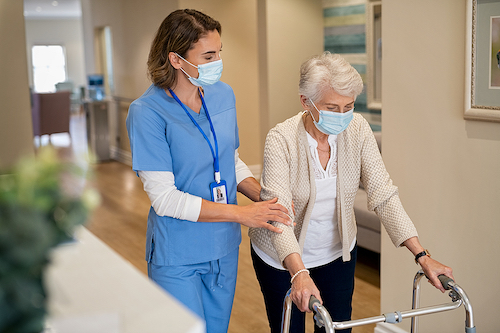 COVID-19 has had a significant mental health impact on both residents and staff members in aged care facilities.
COVID-19 has had a significant mental health impact on both residents and staff members in aged care facilities.
Research published in the American Journal of Geriatric Psychiatry found those working or residing in aged care facilities during the COVID-19 pandemic are experiencing high levels of stress and negative mental health impacts.
“Mental health of staff members working in long term care facilities (LTC) is as important as the mental health of residents and more support should be provided to support good mental health,” Dr. Ashish Sarangi, lead author of the study and co-chief psychiatry resident at the Texas Tech University Health Sciences Center (TTUHSC) School of Medicine, told Theravive.
During the COVID-19 pandemic, life inside nursing homes has been challenging. Approximately 1.3 million Americans live in the 15,600 nursing homes across the United States.
Residents of nursing homes are experiencing heightened levels of isolation and disruption to daily routines. This has resulted in higher levels of stress, anxiety and depression. But it’s not just residents who are experiencing a mental health impact from COVID-19 in nursing homes. Staff are also under pressure.
Sarangi’s study found that there was a significant mental health impact on staff members working in nursing homes. Staff members cited fear of contracting the COVID-19 virus and taking it home to their families, longer shifts and lack of personal protective equipment as factors for their stress.
In undertaking his research, Sarangi used an online survey for staff physicians, registered nurses and LVNs at a nursing home in Lubbock Texas.
The study found that many staff members at the Lubbock nursing home facility did contract COVID-19 and were required to quarantine at home. This meant other staff members were required to work extended shifts to cover for them.
Sarangi said many of those surveyed described this as challenging.
The survey found no visitors, either for residents or staff, were allowed at the facility. Sarangi argued the facility was essentially in lockdown 10 to 12 hours a day. He argues this became problematic for both residents and staff, who experienced considerable loneliness. Staff were not offered counselling.
The nursing home did use telemedicine and other electronic platforms in an attempt to offset the sense of loneliness experienced by staff and residents, but Sarangi’s study found that both staff and residents found the technology unhelpful.
Many of the elderly residents found the technology too difficult to use and the staff found the use of electronic devices added to their work burden, particularly in terms of sanitation. Staff of nursing homes say that the more equipment that was used, the more time staff had to spend sanitizing items before its next use.
“COVID-19 has had a tremendous impact on mental health in all populations but has especially affected the elderly nursing homes significantly. The study is important to highlight the plight of various nursing home providers and inspire various stakeholders to allocate additional resources to staff members working in these settings,” Sarangi said.
The stress that is negatively impacting the mental health of both residents and staff at the care facility was also found to negatively impact physical health.
Sarangi argues this is an important finding as stress can lead to a number of health complications, including weakening the immune system.
As the vaccine rollout continues across the United States, availability of the vaccine for staff and residents in nursing homes has played a role in easing some of the stress related to COVID-19. But Sarangi says more attention needs to be paid to the experiences of the elderly living in nursing homes and the people who care for them.
He says there needs to be better resources and better mental health support for those living and working in care facilities. Possible improvements include more allocation of staff in care facilities, more personal protective equipment, better policies and guidance around managing pandemics in care homes and revisiting visitor policies during outbreaks to try and prevent complete social isolation.
“I plead to various stakeholders to support our residents and staff members of long-term care facilities and our elders in general,” he said.
Elizabeth Pratt is a medical journalist and producer. Her work has appeared on Healthline, The Huffington Post, Fox News, The Australian Broadcasting Corporation, The Sydney Morning Herald, News.com.au, Escape, The Cusp and Skyscanner. You can read more of her articles here. Or learn more about Elizabeth and contact her via her LinkedIn and Twitter profiles.